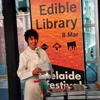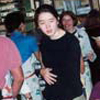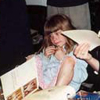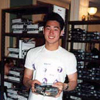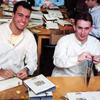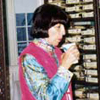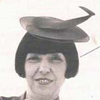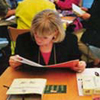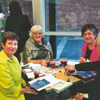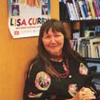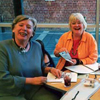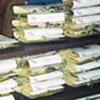Edible Library, 2000 and 2002
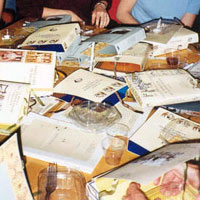 |
Some books are to be tasted, others to be swallowed, and some few to be chewed and digested.
-Sir Francis Bacon (1561 - 1626)
Have you eaten a good book recently?
-Ali&Cia, pamphlet for the Edible Library
The Edible Library was a collective, anonymous performance. It appeared to be a conventional public or university library complete with tables and bookshelves and, as in a special collection, the staff (students correctly dressed as such) attended to the visitors/readers who consulted a catalogue and could request various books. In addition there were open access books that could be taken straight from the shelves. But in all these books the contents, the texts, were edible.
The eleven books available covered gastronomy in Spain during the last two thousand years. One recurring theme, running through all the books from antiquity until the present century, was olive oil. The text inside each book was an example of the cuisine of that period so, for example, in Roman Cooking one found Moretum o Almodrote de Apicius, in The 12th Century Cooking Al Andalus, Berenjenas con Queso and in Convent Cooking of the 17th Century, Alhajú. Alicia insisted on creating a minimum of 1,750 copies in order to simulate a library collection.
The performance thus recreated the normal activities of a library but in an ironic and poetic way. Librarians offered participants user guides and a list of the various books available. Visitors were invited to consult the catalogue carefully and choose which books they wanted to taste. The usual signs prohibiting eating and drinking were substituted for others that declared 'PLEASE EAT AND DRINK IN THE LIBRARY.' The more participants and books (up to 300 people at the same time), the more accurate the realization of the poetic content of the idea.
It's was a tremendously satisfying performance, combining an intellectual game and effort with a very fulfilling sensory experience, making the history of Spanish literature relating to olive oil easy to digest. Not only did participants sample authentic examples of historical recipes, but they left with a memorable document of the sensory profile of the texts and of their own sensory curiosity and experiences.
Performances:
The Edible Library concept was first presented along with book covers at the 1st International Edible Book Tea, at the Centre of Book Arts, New York, U.S.A., April 1, 2000.
It was first performed the following week, April 8, 2000, at the Centre for Foreign Languages, Literatures and Cultures of Williams College, Williamstown, Boston, U.S.A.
It was later performed at the Adelaide Arts Festival, Adelaide, Australia, March 8, 2002.
|
